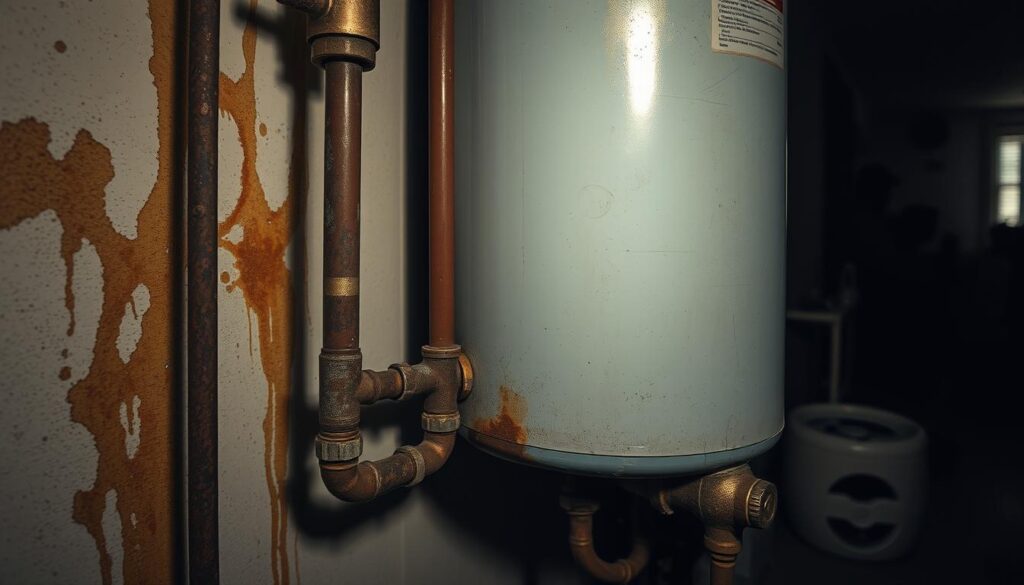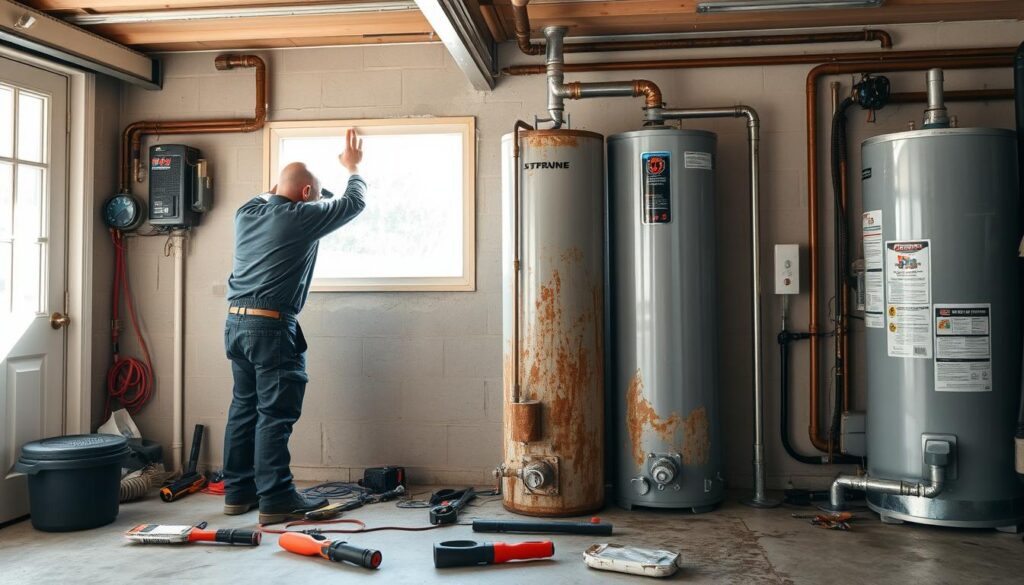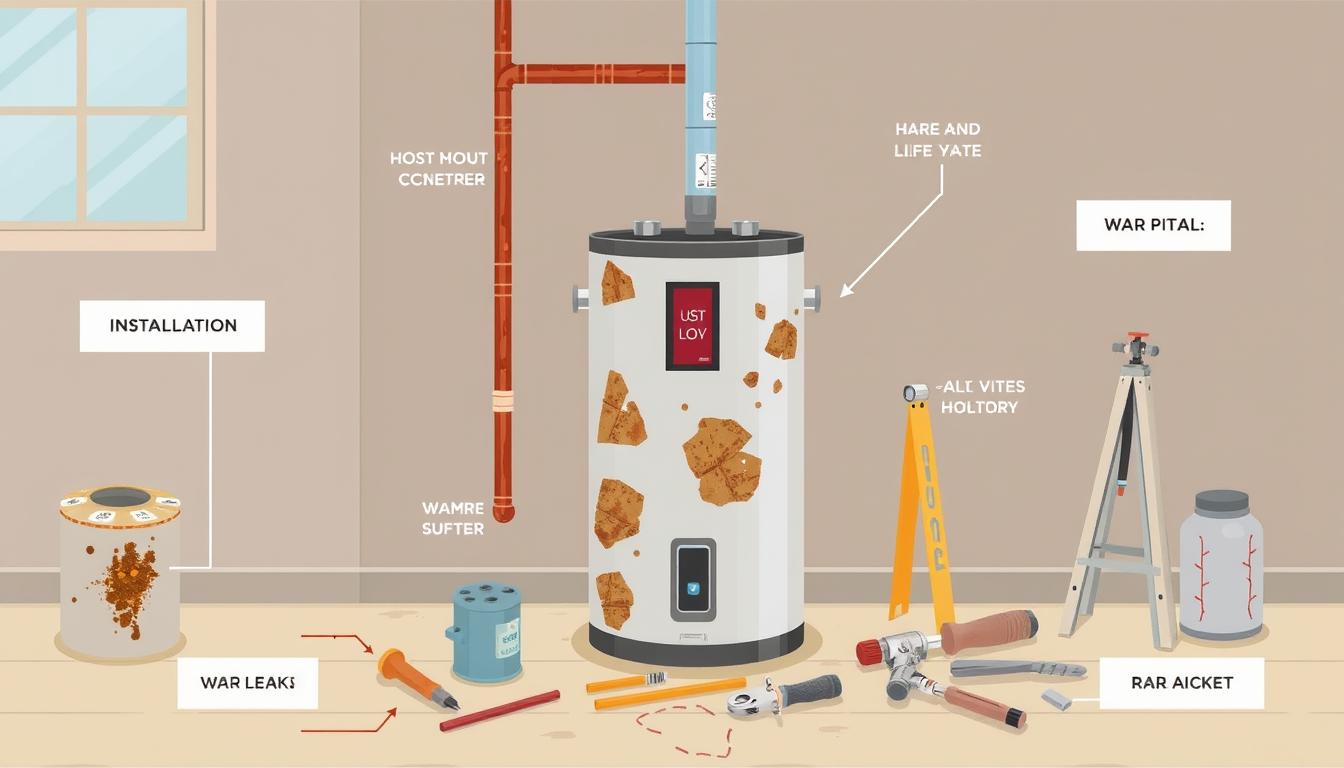As a homeowner, the thought of your hot water heater failing can be stressful. We all rely on hot water for daily needs. But, have you wondered how long your water heater will last? The answer might surprise you.
On average, a water heater lasts about 10 years. This makes many homeowners think about replacing it when it hits that mark. But, the actual life span depends on the type, how much you use it, and how well you maintain it. Knowing how long different models last can help you plan and keep your home’s hot water flowing.
Table of Contents
average life of hot water heater: Understanding Hot Water Heaters
Hot water heaters are key in our homes, giving us warm water for daily needs. They come in many types, each with its own benefits. Knowing about these types helps when it’s time to get a new one.
Types of Hot Water Heaters
The most common types are:
- Traditional tank heaters – These keep water hot all the time, ready for use.
- Tankless (or on-demand) water heaters – These heat water only when needed, saving energy.
- Heat pump water heaters – These use air heat to warm water, saving energy too.
How They Work
Traditional tank heaters keep water hot in a tank, ready to use. Tankless models heat water as it flows, no tank needed. Heat pump water heaters move air heat to water, saving energy.
| Water Heater Type | Average Lifespan | Warranty Range |
|---|---|---|
| Traditional Tank | 8-12 years | 6-12 years |
| Tankless | 20+ years | 10-25 years |
| Heat Pump | 10-15 years | 6-12 years |
Knowing about hot water heater types helps choose the right one for your home. Whether it’s a tank heater, tankless hot water heater, or a heat pump, proper installation and care are crucial. They ensure your heater works well and saves energy for years.
Average Lifespan of Different Models
Hot water heaters have lifespans that vary a lot. Knowing these averages helps you choose the best for your home.
Traditional Tank Heaters
Traditional tank heaters last from 6 to 13 years. A 6-year lifespan is quite short. Most come with a 6 to 12 year warranty. You can also buy extended warranties for 1 to 3 more years.
Tankless Water Heaters
Tankless water heaters last longer, up to 20 years or more. They don’t have a tank, so they last longer. Their warranties often cover the heat exchanger for 10 to 25 years.
Heat Pump Water Heaters
Heat pump water heaters are ENERGY STAR certified. They save money and last longer than traditional models. With care, they can work well for 10 to 15 years.
| Water Heater Type | Average Lifespan | Typical Warranty Period |
|---|---|---|
| Traditional Tank Heaters | 6-13 years | 6-12 years (with option to extend 1-3 years) |
| Tankless Water Heaters | 20+ years | 10-25 years (heat exchanger) |
| Heat Pump Water Heaters | 10-15 years | Varies by manufacturer |
Understanding the lifespans of different hot water heaters helps you plan. It guides you in choosing the right one for your home.
Factors Affecting Hot Water Heater Lifespan
Several key factors influence your hot water heater’s lifespan. Knowing these can help keep your water heater working well for longer.
Water Quality
The quality of your water affects your hot water heater. Hard water, full of minerals like calcium and iron, can clog the tank. This reduces efficiency and can cause early failure. Flushing the tank regularly can remove these deposits and extend its life.
Usage Patterns
Your household’s hot water use also matters. Homes with lots of people or frequent laundry use more hot water. This can wear out the system faster, shortening its lifespan.
Maintenance Practices
Keeping your hot water heater well-maintained is key. Regular checks, tank flushing, and anode rod inspections prevent corrosion. Without these, your heater’s life can be much shorter.
By understanding and tackling these factors affecting water heater lifespan, you can keep your hot water heater running smoothly for years.
“Proper maintenance is the key to extending the life of your hot water heater. Regular inspections and timely repairs can save you from the hassle and cost of an unexpected replacement.”
Signs Your Hot Water Heater Is Failing
Your hot water heater is key for daily tasks like showering and cleaning. It can fail over time, but spotting problems early helps. This ensures you always have hot water.
Unusual Noises
Strange noises like popping or crackling from your hot water heater mean sediment buildup. Minerals and debris in the tank can cause these sounds and lower efficiency.
Fluctuating Water Temperature
Fluctuating water temperature is another sign of trouble. It might mean the thermostat or heating element is failing. This can make hot water uneven or scarce, which is both inconvenient and dangerous.
Leaks and Rust
Leaks or rust on your hot water heater mean it’s almost time to replace it. Leaks can damage your home, and rust weakens the tank. If you see leaks or rust, get it checked and fixed or replaced fast.
Noticing these hot water heater failure signs lets you fix problems early. This keeps your water heater running well and saves you from expensive hot water heater repair costs later.

Maintenance Tips for Longevity
Keeping your hot water heater in good shape is key to making it last longer and work better. Regular checks, tank flushing, and anode rod inspections are must-do tasks. They help your water heater run smoothly for many years.
Regular Inspections
Annual inspections are a smart move. They help spot small problems before they get big. A pro can look for wear, check connections, and make sure everything works right.
Flushing the Tank
Sediment builds up in the tank over time. This can make your water heater less efficient and shorter-lived. Flushing the tank yearly or as the maker suggests can clear out this sediment. It keeps your water heater working its best.
Checking Anode Rods
The anode rod protects your water heater from rust. Replacing it every 3-5 years can make your hot water heater last longer.
By sticking to these easy maintenance tips, you can extend the lifespan of your hot water heater. This ensures it keeps providing reliable, efficient hot water. Regular hot water heater maintenance is vital for water heater efficiency. It also helps you get the most out of your home’s plumbing system.
Repair vs. Replacement: What to Consider
When your hot water heater breaks down, you face a big decision. Should you fix it or get a new one? This choice affects your budget and how much energy your home uses. Here are some important things to think about when deciding to repair or replace.
Cost of Repairs
Repair costs are key. Gas water heaters last about 10 years, while tankless ones can go over 20 years. If fixing it would cost half as much as a new one, it’s smarter to get a new, energy efficient hot water heater. This will save you money later on.
Age of the Unit
The age of your water heater matters too. Storage tank models usually last 8-12 years. If your unit is almost done, it’s cheaper to replace the hot water heater than to keep fixing it.
Energy Efficiency Improvements
Getting a newer, energy efficient hot water heater can cut your bills. ENERGY STAR certified heat pump water heaters are 2-3 times better than old ones. They can save you hundreds on energy costs over time.
Choosing to repair or replace your hot water heater should be a thoughtful decision. If it breaks down a lot, repair costs go up, and it uses more energy, it’s time to consider hot water heater replacement for your home.
The Importance of Professional Installation
Getting a professional to install your hot water heater is key. It ensures your appliance works well and lasts longer. Experts can spot and avoid mistakes that harm your water heater’s efficiency and life span.
Benefits of Hiring Professionals
- They make sure the water heater fits your home’s hot water needs, saving energy and money.
- They connect it right to your plumbing, avoiding leaks and early failure.
- They help choose the right water heater for your home and family’s needs.
- They give tips on keeping your water heater in top shape for years.
Common Installation Mistakes
Trying to install it yourself can cause problems. These include:
- Choosing the wrong size, leading to not enough or too much hot water.
- Bad connections can cause leaks and damage.
- Not installing it in a well-ventilated area can make it less efficient.
- Ignoring the manufacturer’s instructions for electrical or gas connections can be unsafe.
Choosing a pro for your hot water heater installation means your new appliance will work well for a long time. This saves you time, money, and stress in the future.
Preparing for Replacement
When it’s time to replace your hot water heater, planning is key. Setting a budget and picking the right model for your home makes the process smoother and cheaper.
Budgeting for a New Water Heater
The cost of a new hot water heater varies. It depends on the tank size, energy efficiency, and installation needs. You might spend $800 to $1,500 for a standard tank-style heater. Or, $1,500 to $3,000 for a tankless or heat pump model.
Consider rebates and tax credits to lower the cost. Utility companies offer rebates for energy efficient hot water heaters. You might get up to $2,000 in federal tax credits for certain models until 2032.
Choosing the Right Model
- Figure out your household’s hot water needs to pick the right tank size or tankless unit capacity.
- Choose an ENERGY STAR certified model. It can save a family of four over $330 a year on electric bills.
- Decide between a traditional tank-style, tankless, or heat pump water heater. Consider your home’s layout, energy goals, and budget.
- Use the ENERGY STAR Home Upgrade Tool. It helps find the best hot water heater replacement for your home and local installers.
Plan ahead and pick the right energy efficient hot water heater for your needs. This ensures a smooth and affordable replacement when your old unit needs to go.

Closing Thoughts on Hot Water Heater Lifespans
Summary of Key Points
The life of a hot water heater can vary a lot. Traditional tank models usually last 8 to 12 years. But, tankless heaters can go up to 20 years or more. The type of heater, water quality, how often you use it, and maintenance all affect its life.
Regular checks, tank flushing, and anode rod inspections can help your heater last longer.
Encouragement for Homeowners
As a homeowner, taking care of your water heater can save you money in the long run. Don’t wait for it to break down before you act. By keeping up with maintenance and choosing energy-efficient models, you can save a lot.
By being proactive, your water heater will work well for many years. With the right care, you’ll have hot water when you need it, making your home more comfortable and convenient.
